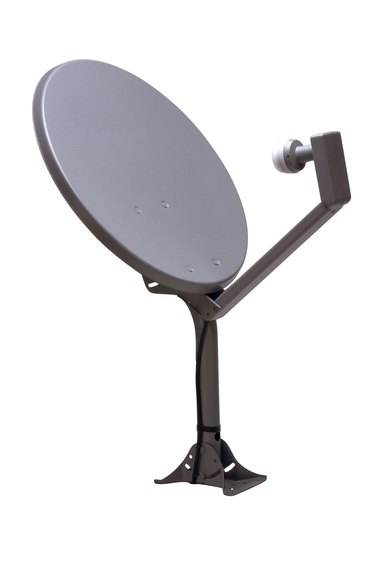
Anything that interrupts the signal between DirecTV's in-orbit satellite and your HD DVR receiver has the potential to turn an evening in front of the TV into a frustrating experience. Pixelation and freeze-framing are two issues that appear when the satellite signal is obstructed; however, an obstructed satellite isn't the only cause of these problems.
Incompatible Equipment
Video of the Day
The DirecTV HD DVR receiver is connected to both the television and a length of coaxial cable that attaches the receiver to your home's satellite dish. The HD DVR receiver and your TV must be compatible in order to work properly. For example, if you're using a standard definition television, you won't be able to watch HD programming even if you have an HD receiver. Outdated technology is also to blame; a TV with a low refresh rate may not be able to keep up with the signal sent by your receiver. This leads to pixelation and freeze frames, as your TV struggles to process the receiver's data.
Video of the Day
Bad Weather
Meteorological factors like sun, rain and clouds have the potential to impact your DirecTV signal. Anything that physically obstructs the direct line of sight between your home's dish and DirecTV's satellite can degrade the signal -- this includes terrestrial-based obstructions like plants and buildings, as well as weather events like rain, snow, sleet and clouds. When an obstruction like this blocks the signal's path to your home, it makes it impossible for your HD DVR receiver to accurately process the signal, leading to problems like tiled pixels and stop-and-go pictures on your screen. The sun plays a role too; solar flares disrupt the earth's electromagnetic fields, causing radio-wave interruptions to your signal.
Resetting Your Box
Sometimes resetting your HD DVR receiver is all it takes to stop these picture problems. DirecTV suggests unplugging your receiver for 15 seconds, then plugging it back in. This causes the receiver to automatically reset itself; when it resets itself, it also checks for technical updates from DirecTV, in some cases resolving the pixelation and freeze-framing issues.
Playback Problems
Pixelation and freeze-framing are a more significant problem for many DirecTV subscribers while using their receiver's DVR features. The DVR's playback mechanism allows you to watch recorded programs rather than live TV; to provide as much storage as possible, your DirecTV HD DVR receiver records programs at a lower quality than it plays live television. The "Catch 22" of this scenario is that the lower quality of a recorded show leads to picture problems like freeze frames and pixelation; additionally, if your receiver suffered any signal interruptions as it was recording a show, you'll see those as well during playback.
Asking For Help
If you know that incompatible or outdated equipment isn't a problem, and you've eliminated a physical obstruction as a cause for your picture problems, it could be an equipment problem on DirecTV's end. Call the company's customer service line at 1-800-531-5000 and ask for technical support; a trained representative will be able to walk you through the process of testing your satellite to make sure it's pointed in the optimal direction to receive the strongest signal possible. Sometimes, a faulty HD DVR receiver may be to blame; replacing the receiver with a new one may solve the picture issues.